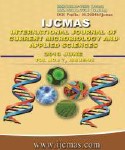


 National Academy of Agricultural Sciences (NAAS)
National Academy of Agricultural Sciences (NAAS)

|
PRINT ISSN : 2319-7692
Online ISSN : 2319-7706 Issues : 12 per year Publisher : Excellent Publishers Email : editorijcmas@gmail.com / submit@ijcmas.com Editor-in-chief: Dr.M.Prakash Index Copernicus ICV 2018: 95.39 NAAS RATING 2020: 5.38 |
Recent times copper nanoparticles (CuN) has gained attention due to its multifaceted action against several microbes. However, its impact on beneficial plant microbes has not much studied. To fill these knowledge gaps, copper nanoparticles were tested for antibacterial ability against well-known two plant biocontrol agents Pseudomonas fluorescens and Bacillus subtilis by an in vitro bioassay using disk diffusion methodology. Antibacterial activity of CuN was compared with botanicals like clove, pepper and standard antibiotics like ampicillin and streptomycin. Our study results revealed that CuN recorded higher effectiveness for both P. fluorescens and B. subtilis with maximum inhibition zone compared to others tested. Test results illustrate that, bio agents P. fluorescens and B. subtilis found to be sensitive to CuN. In conclusion, our research could help in determination of microbial strain specificity and to better understand nanoparticles usage for specific purposes. However, further research is needed to better understand CuN role, mechanisms and impact on beneficial plant microorganism in agriculture.
 |
 |
 |
 |
 |